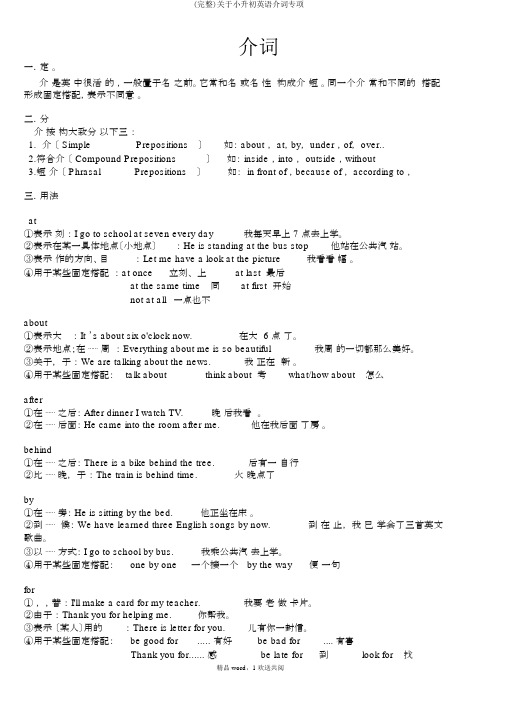小升初英语总复习介词专题
- 格式:doc
- 大小:49.50 KB
- 文档页数:3

介词介词( Prepositions )一.考点精讲介词高频考点相关介词主要用法示例in一般表示较长时间。
后接年、季节或月份,也可以接上午、下午或晚上in 1990 in summer in Mayin the morning / afternoon / eveningon 星期;具体到某天的时间;在左、右on Monday on Sunday on May 1ston Children’s Day on the left / rightat 表示某一时刻或时段at 3:00 at noon at night at that time 二.必备词汇分类内容表示时间at在(几点) in在(年、月) on在(星期、日期)after在…之后before在…之前from…to…从…到…表示方位at在…in在…里面on在…上面near在…附近next to挨着behind在…后面in front of在…前面under在…下方beside在…旁边between在…之间above在…上方表示方向into进入out外面across横穿through穿过其他of…的with用for为;给about关于Tips: 在表示“在…上方”时,on表示与物体接触的上方,above表示不与物体接触的上方三.含有介词的常见短语at home在家at first首先at once立刻be afraid of害怕be angry with生气ask for要求be good for对…有益agree with同意be good at擅长get on上车by the way顺便说一下be different from与…不同be famous for因…而出名get off下车come from来自listen to听laugh at嘲笑get to到达look at看look after照顾look like看起来像look for寻找play with玩…put on穿上in English用英语on holiday度假in front of…在…前speak to和…讲话take off脱下talk about谈论try on试穿turn on打开write to给…写信四.真题速递1. We usually stay _______ home _______ Saturday afternoon (单项选择)A. at ; inB. at ; onC. in ; atD. on ; on2. Help me _______ my English, please. I don’t it’s good _______ me. (单项选择)A. with ; forB. on ; toC. on ; forD. with ; at3. My father’s birthday is _______ August 26th. (填写恰当的介词)【参考答案】1. B 2. D 3. on。

小升初英语总复习介词专题小升初英语总复习介词专题介词一般置于名词之前。
它常和名词或名词性词语构成介词短语。
一、表示时间的介词注意:不用介词表示的词组:如:Did you do your homework last night?I am going to Beijing next Sunday.What are you going to do this afternoon?三、表示地点位置的介词1. at+小地方:at home; at school; at the bus stop; at the library;2. in+大地方:in China; in Zhaoqing;四、固定搭配1. listen to---听write to----写; look at-----看; Please listen to me. 请听我讲。
I will write to you later. 我晚点会写信给你的。
Please look at the picture 让看着这幅图。
小升初英语总复习介词专题2. in +科目:in English: What's this in English? 这用英语怎么说?inblack clothes 穿黑色衣服3. for +动词ing: Thank you for helping me. 谢谢你帮我。
for+某人:I'll make a card for my teacher. 我要给老师做张卡片。
for+早午晚餐:It’s time for breakfast. =It’s time to have breakfast.4. about1) 大约:It’s about six o'clock now. 现在大约6点钟了。
2) 关于:We are talking about the news. 我们正在谈论新闻。
3) 对于:What about you? 你呢?5. by +交通工具(by bike/bus/car/plane/train)on foot I go to school by bus. 我乘公共汽车去上学。



介词一.定。
介是英中很活的,一般置于名之前。
它常和名或名性构成介短。
同一个介常和不同的搭配形成固定搭配,表示不同意。
二.分介按构大致分以下三:1.介〔 Simple Prepositions〕如:about,at,by,under,of,over..2.符合介〔 Compound Prepositions〕如:inside,into,outside,without3.短介〔 Phrasal Prepositions〕如:in front of,because of,according to,三.用法at①表示刻: I go to school at seven every day我每天早上7点去上学。
②表示在某一具体地点〔小地点〕: He is standing at the bus stop他站在公共汽站。
③表示作的方向、目:Let me have a look at the picture我看看幅。
④用于某些固定搭配: at once立刻、上at last 最后at the same time同at first 开始not at all一点也不about①表示大: It ’s about six o'clock now.在大6点了。
②表示地点;在⋯⋯周: Everything about me is so beautiful我周的一切都那么美好。
③关于,于: We are talking about the news.我正在新。
④用于某些固定搭配:talk about think about 考what/how about怎么after①在⋯⋯之后: After dinner I watch TV.晚后我看。
②在⋯⋯后面: He came into the room after me.他在我后面了房。
behind①在⋯⋯之后: There is a bike behind the tree.后有一自行②比⋯⋯晚,于: The train is behind time.火晚点了by①在⋯⋯旁: He is sitting by the bed.他正坐在床。

小升初英语专项五:介词一、知识点回顾介词概念:介词又叫前置词,是一种用来表示词与词、词与句之间关系的词,它一般放在名词、代词(宾格)或动词(动词ing形式)前面。
(一)时间介词1.用at的时间短语具体时刻: at 7 o'clock at 9:15用餐时间: at lunch time at tea break节日: at Christmas at Easter年龄: at ten/at the age of ten其他时间:在中午______________ 在晚上________________ at that time at(on)weekends 2.用on的时间短语(主要表示具体某一天,包括某一天的上午、下午或晚上)星期几: 在星期日_________________________星期几的上午/下午/晚上: 在星期二下午_____________________日期: on May 21st日期的上午/下午/晚上: on the morning of January 22nd节日: 在儿童节_________________________3.用in的时间短语泛指一天的上午、下午或晚上: in the morning/afternoon/evening月份: 在八月份_____________________年份: in 2010季节: in ________/________/ _________/__________在春/夏/秋/冬季※年龄: in her twenties在她二十多岁时in his fifties在他五十多岁时后加一段时间:表示一段时间之后,用于将来时:I will come back in two days.小试牛刀:使用in, on, at填空____ Monday ____8:00 ____the morning ____Friday evening____dawn ____half past four ____dusk ____a rainy evening____March, 1981 ____Oct. 10 ____Children’s Day ____five fifteen____the age of 6 ____night ____2002 ____June 9th , 2017 (二)表示空间和方位的介词1. at, inat用于建筑物机场、车站等较小范围的地点;在家_____________ 在学校______________ at the sports meet在运动会上在晚会上_________________ 在机场______________ 在汽车站_________________ in用于国家城市等较大范围的地点在世界上_________________ 在美国_____________ 在上海___________________ ※注意:当同一场所被看为一个地点,不强调在空间时用at;当强调其内在的空间时用in, Eg: Let's meet at Wanda Cinema.There are 1,000 seats in Wanda Cinema.2. on, above, over, below, underon:表示“....上面”,有接触面,Eg: 碗在桌子上。
小升初介词知识点总结1. in, on, at的用法in, on, at是英语中最常见的三个介词,它们在句子中起着重要的作用。
它们的用法如下:- in:in表示在某个范围内或在某个地点内。
例如:in the classroom(在教室里)、in China(在中国)。
- on:on表示在某个平面或表面上。
例如:on the table(在桌子上)、on the wall(在墙上)。
- at:at表示在某个具体的时间或地点。
例如:at 3 o'clock(在三点钟)、at the bus stop (在公交车站)。
2. with, without的用法with和without是表示具有或缺少某种特征的介词,它们的用法如下:- with:with表示带有某种特征或附带某种条件。
例如:with a book(带着一本书)、with my friends(和我的朋友们一起)。
- without:without表示不带有某种特征或不具备某种条件。
例如:without any help(没有任何帮助)、without permission(未经允许)。
3. behind, in front of的用法behind和in front of是表示位置关系的介词,它们的用法如下:- behind:behind表示在某个物体的后面。
例如:behind the door(在门后面)、behind the tree(在树后面)。
- in front of:in front of表示在某个物体的前面。
例如:in front of the school(在学校前面)、in front of the car(在车前面)。
4. between, among的区别between和among都表示在两个或多个事物之间的关系,但它们的用法有一些区别:- between:between表示在两个事物之间的关系。
例如:between the two trees(在两棵树之间)、between Monday and Friday(在星期一和星期五之间)。
介词一.定义。
介词是英语中很活跃的词,一般置于名词之前。
它常和名词或名词性词语构成介词短语。
同一个介词常和不同的词语搭配形成固定搭配,表示不同意义。
二.分类介词按结构大致分为以下三类:1.简单介词(Simple Prepositions)如:about,at,by,under,of,over..2.符合介词(Compound Prepositions)如:inside,into,outside,without3.短语介词(Phrasal Prepositions)如:in front of,because of,according to,三.用法at①表示时刻:I go to school at seven every day 我每天早上7点去上学。
②表示在某一具体地点(小地点):He is standing at the bus stop 他站在公共汽车站。
③表示动作的方向、目标:Let me have a look at the picture 让我看看这幅图。
④用于某些固定搭配:at once 立刻、马上at last 最后at the same time 同时at first 开始时not at all 一点也不about①表示大约时间:It’s about six o'clock now. 现在大约6点钟了。
②表示地点;在……周围:Everything about me is so beautiful 我周围的一切都那么美好。
③关于,对于:We are talking about the news. 我们正在谈论新闻。
④用于某些固定搭配:talk about 谈论think about考虑what/how about 怎么样after①在……之后:After dinner I watch TV. 晚饭后我看电视。
②在……后面:He came into the room after me. 他在我后面进了房间。
小升初重难点整理介词的用法归纳介词在英语中扮演着非常重要的角色,它能够连接名词、代词、动词或者形容词等词语,帮助我们表达时间、地点、方式、原因等关系。
在小升初的英语考试中,介词的用法是一个重要的考点。
本文将对小升初英语考试中常见的介词用法进行整理和归纳。
一、表示位置和方向的介词1. in- 表示在某个大区域之内:in the room(在房间里)- 表示在某个城市或国家:in Beijing(在北京)- 表示在某个交通工具上:in the car(在车里)2. on- 表示在某个平面上:on the table(在桌子上)- 表示在某个日期或时间:on Monday(在星期一)3. at- 表示在某个点上:at the bus stop(在公交车站)- 表示在某个具体地点:at the park(在公园)4. under- 表示在某个物体下面:under the bed(在床底下)5. behind- 表示在某个物体后面:behind the tree(在树后面)6. next to- 表示在某个物体旁边:next to the library(在图书馆旁边)7. between- 表示在两个物体之间:between the two buildings(在两个建筑物之间)二、表示时间的介词1. in- 表示在某个年、季度、月等的时间段内:in 2022(在2022年) - 表示在某个时间上午或下午:in the morning(在早上)2. on- 表示在某个具体的日期:on June 1st(在6月1日)- 表示在某个星期几:on Sunday(在星期天)3. at- 表示在某个具体的时间点:at 9 o'clock(在9点钟)三、表示原因的介词1. because of- 表示因为某个原因:I couldn't go to the party because of the rain.(因为下雨,我不能去参加聚会)2. due to- 表示由于某个原因:The delay of the flight was due to the bad weather.(航班延误是由于天气恶劣)四、表示方式的介词1. by- 表示通过某种方式:by bus(乘坐公交车)- 表示凭借某种手段:by using a calculator(通过使用计算器)2. with- 表示使用某种工具或方式:write with a pen(用钢笔写)五、表示比较和区别的介词1. like- 表示像某人或某物:She looks like her mother.(她长得像她妈妈) - 表示和...相似:He plays basketball like a professional.(他打篮球像个职业球员)2. unlike- 表示和...不同:Unlike his brother, he doesn't like sports.(和他哥哥不同,他不喜欢运动)六、表示目的的介词1. for- 表示为了某个目的:I bought a gift for my friend.(我给朋友买了一份礼物)2. to- 表示朝着某个目的地或目标:I am going to school.(我正要去学校)总结:介词在英语中的用法是一个重要的语法考点,对于小升初的考生来说尤为关键。
关于小升初英语语法总结:介词的分类
从介词本身的结构来看:
1.简单介词:at,in,on,since,from
2.复合介词:asfor至于;asto关于;outof从,出自;into 进入;onto到上面去
3.二重介词:fromunder从的下面;frombehind从的后面;untilafter直到之后;fromamong从当中
4.短语介词:accordingto根据;aheadof在之前;apartfrom 在之外;becauseof由于;bymeansof以之手段;bywayof经由从介词本身的意义来看:
1.表示时间的介词
about,around,before,by,at,after,in,on,around,betwee n,during,for,from,since,till,until,within
2.表示地点的介词
about,at,in,on,over,through,across,along,around,bef ore,between,beyond,down,up,to,toward,under,near
3.表示方式的介词
bybus乘公共汽车
seewithonesowneyes亲眼看
writeinink用墨水写
onfoot步行,徒步Helookedatmewithoutexpression.他毫无表情地看着我。
4.表示原因的介词
Hewaspunishedforstealing.他因偷窃而被惩罚。
介词
一般置于名词之前。
它常和名词或名词性词语构成介词短语。
一、表示时间的介词
注意:不用介词表示的词组:
this year; this morning; last night; last summer; next Sunday;
yesterday; tomorrow
如:Did you do your homework last night?
I am going to Beijing next Sunday.
What are you going to do this afternoon?
三、表示地点位置的介词
1. at+小地方: at home; at school; at the bus stop; at the library;
2. in+大地方: in China; in Zhaoqing;
四、固定搭配
1. listen to---听 write to----写; look at-----看;
Please listen to me. 请听我讲。
I will write to you later. 我晚点会写信给你的。
Please look at the picture 让看着这幅图。
2. in +科目:
in English: What's this in English? 这用英语怎么说?
in black clothes 穿黑色衣服
3. for +动词ing: Thank you for helping me. 谢谢你帮我。
for+某人:I'll make a card for my teacher. 我要给老师做张卡片。
for+早午晚餐: It’s time for breakfast. =It’s time to have breakfast.
4. about
1) 大约: It’s about six o'clock now. 现在大约6点钟了。
2) 关于: We are talking about the news. 我们正在谈论新闻。
3) 对于: What about you? 你呢?
5. by +交通工具(by bike/bus/car/plane/train) on foot
I go to school by bus. 我乘公共汽车去上学。
6. like
1) 像……样: He looks like his father. 他像他的父亲。
2) 怎样: What's the weather like? 天气怎样。
7. of 表示所属关系: This is a photo of my family. 这是一张我家的照片。
8. to
1) He walks to the window. 他走向窗户。
2) Please count from ten to thirty. 请从10数到30.
3) Happy New Year to you. 大家新年好。
with
1) 和: Could you go home with me? 你能和我一起回家吗?
2) 表示伴随状态,带有: Who's that girl with glasses? 那位戴眼睛的女孩是谁?
3) He helped me with the packbag.
4) What’s wrong with you?
----------------------------------------------------------------------------------------------------------------------------- 练习:
一、用介词填空
1. Tom gets up_____ seven every morning.
2. ________ Sunday morning, he played football with his friends.
3. What’s wrong ________ you?
4. There is something wrong ________ my back.
5. He often helps me ________ my English.
6. It’s time ________ breakfast.
7. Can you sing a song ________ English?
8. He looks ________ his father.
9. Please listen ________ me carefully.
10. It’s too cold. Don’t take ________ your coat.
11. I go to school ________ foot every day.
12. He sits ________ Tom and Mary.
13. I work ________ Monday ________ Friday.
14. He is ill, so he is staying ________ bed.
15. Don’t be late ________ this meeting.
16. Tony is ________ Canada.
17. Betty is English. What ________ you?
18. Who’s the woman ________ the black dress?
19. Where do you come ________?
20. Do the students stay ________ home ________ Saturday?
21. My mother cut the cake ________ a knife.
22. The meeting ended ________ 6:00 p.m.
23. We’ll play football _________ class.
24. Go __________ this road, turn left ________ the first crossing.
25. Can you tell me the way ________ the zoo?
26. —where are you from?
—I am ________ Beijing.
27. Let’s count the numbers ________ one ________ fifty.
28. —Where shall we meet?
—We’ll meet ________ home.
29. I live _______ Zhaoqing.
30. This is a map ______ China.
31. Happy birthday ______ you.
32. Thanks _____ telling me.
33. It’s cool ____ fall.
34. The dog swam ______the kite and returned the kite _____ me.
35. The birds are singing _____ the tree.。